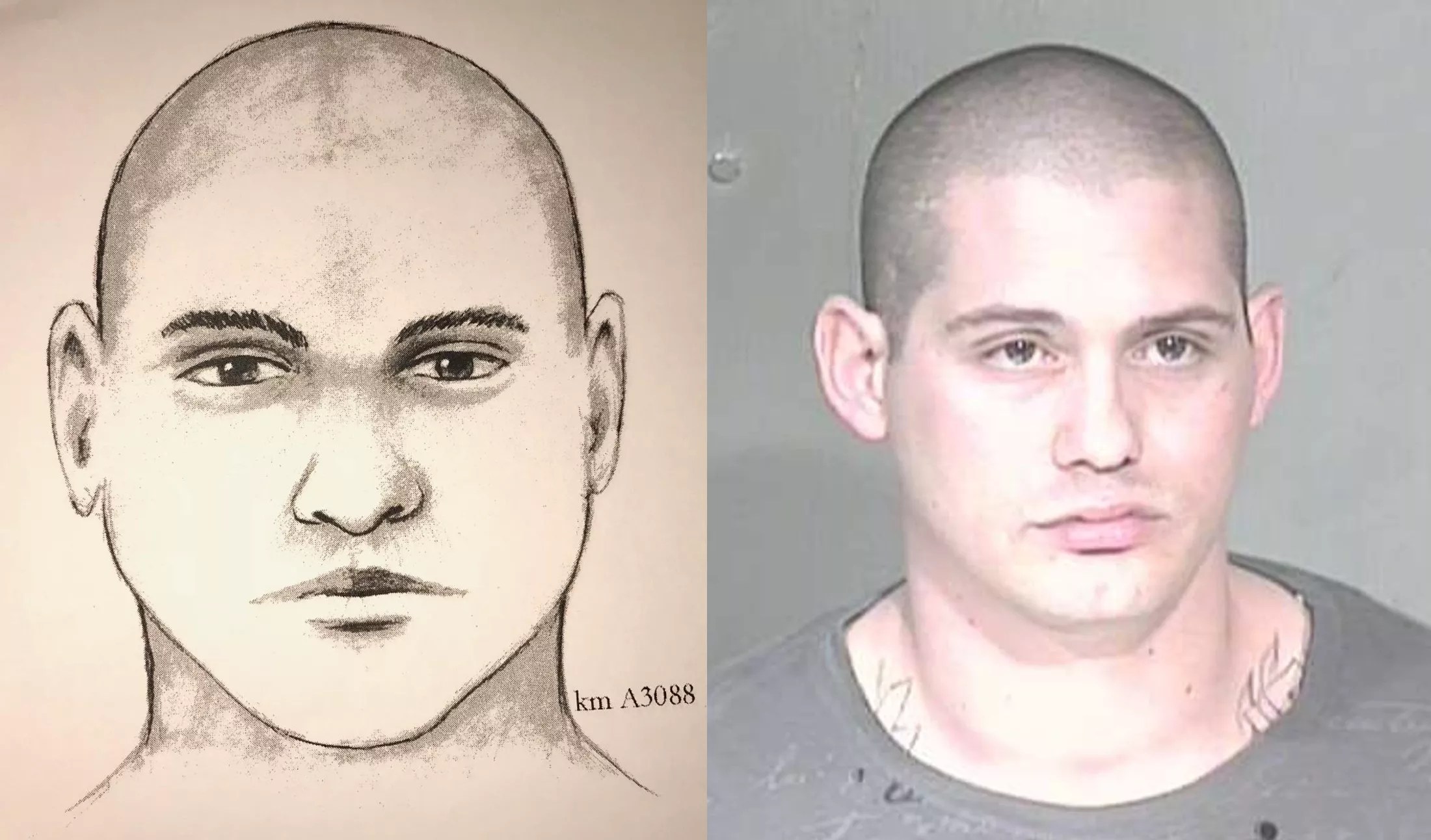
Phoenix Police Department/Arizona Department of Corrections

Audio By Carbonatix
Pain and hurt have carved lines into Jeffery Wellmaker’s face that cannot be erased. And his voice occasionally breaks when he talks about the love of his life, Kelley Ann Jaeger.
Jaeger was shot down in the early morning hours of October 3, 2009, two days before her 40th birthday. Authorities say her death was a vicious hate crime committed by members of the Vinlanders Social Club, a notorious white supremacist gang known for its extreme violence and affinity for Nazi symbolism.
Wellmaker gave Phoenix New Times an exclusive interview the eve of his testimony in the ongoing first-degree murder trial of Travis Ricci, which began June 6 in Maricopa County Superior Court and is expected to run for the next several weeks. The Vinlander gang member is charged with killing Jaeger with a 12-gauge shotgun fired from the passenger’s side of a white sedan.
As the car approached him that night, Wellmaker described how time seemed to slow down.
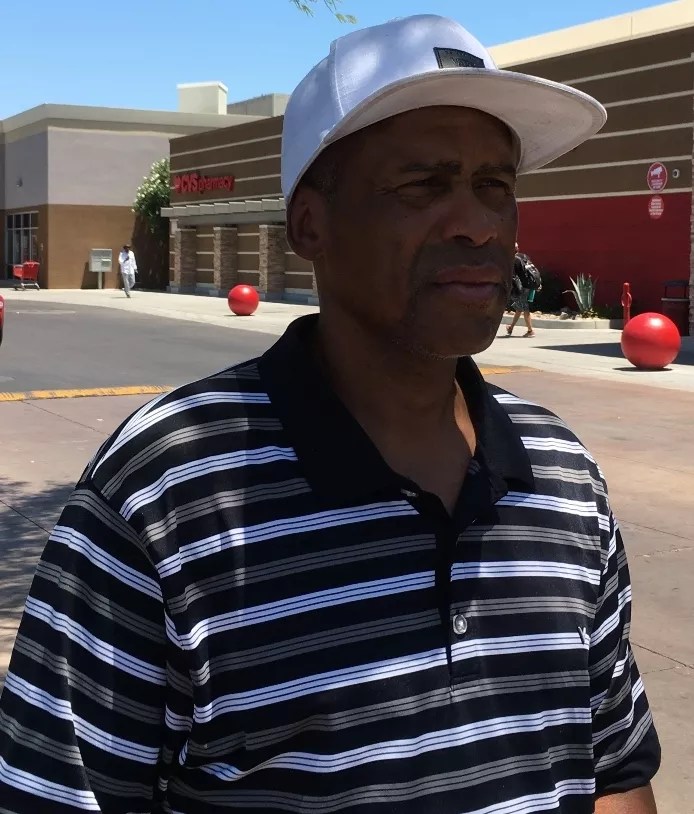
Jeffery Wellmaker talks about the death of his girlfriend, Kelly Jaeger.
Stephen Lemons
He and Jaeger were standing next to a pay phone near the sidewalk at 415 East Puget Avenue, just west of Seventh Street, in the gritty Sunnyslope area of Phoenix. The vehicle passed them, did a U-turn and circled back. Wellmaker knew something was wrong.
“I said, ‘Baby, watch out!,'” he recalled. “I saw fire, and then I saw what looked like flies coming out at me. I felt a punch in my stomach, and then the wind. Everything speeded up, and then she dropped.
“I said, ‘Baby, you hit?'”
Wellmaker saw that those deadly “flies” had ripped through Jaeger’s torso, and that she was trying to breathe. Distraught, he called 911 from the pay phone.
Phoenix police found Wellmaker holding Jaeger’s hand, begging her to wake up. He was so upset and reluctant to leave her side that the cops handcuffed him and placed him in the back of a patrol car until he calmed down. Jaeger was transported to John C. Lincoln Medical Center, just a couple of blocks away. She was pronounced dead on arrival.
Wellmaker, now 57, is African-American, and Jaeger was white. That shouldn’t matter in our day and age, but it did to the pair’s attackers.
Earlier that evening, as Wellmaker and Jaeger were walking near Palma Park, at 12th Street and Dunlap Avenue, they were approached by a muscular white male in shorts with his shirt off, who taunted them with racial epithets.
“Hey, nigger, what are you doing with that white girl?” the man asked.
Wellmaker turned toward the man, but Jaeger pulled him away.
“C’mon, baby, let’s go,” Wellmaker remembered her saying.
The man followed them as they headed toward Seventh Street, yelling things like “spearchucker” and something about “white power.” When Wellmaker looked back at him, his eyes were drawn to a unique tattoo with zig-zag lettering across the man’s stomach.
He later saw the man hop into another vehicle and leave. About 45 minutes later, the white car came around and dealt death to Jaeger. Wellmaker recognized the shooter as the same man who had followed them from Palma Park.
Wellmaker was the state’s first witness in Ricci’s trial. At one point, prosecutor Ryan Green asked Wellmaker if he saw Jaeger’s murderer in court.
“It was that motherfucker right over there,” Wellmaker said angrily, indicating Ricci, seated at the defense table.
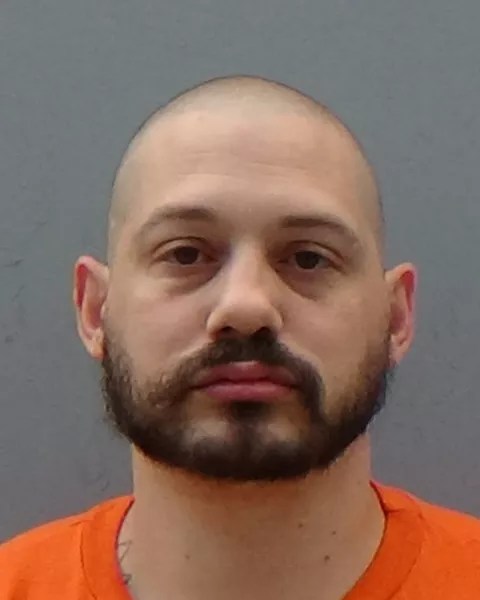
Travis Ricci with beard.
Arizona Department of Corrections
Ricci, who turns 37 in September, faces a possible death sentence if convicted. No wonder he was dressed like a choirboy, in a tie and long-sleeve dress shirt. Though his hair has grown out from his skinhead days, it’s been cut short, with a little flip toward his brow. His expression remained impassive, save when he was kidding around with his defense team once the jury left the room.
His clothing mostly hides his tattoos. These include a swastika and SS lightning bolts on either side of his neck. He also has the German words Meine Ehre Heisst Treue emblazoned on his forearms in fat, black script – which translates to “My honor is my loyalty.” That was the motto of Hitler’s dreaded Shutzstaffel. On his stomach is the word “Ricci” in a turquoise tint, with jagged lettering.
The letters across Ricci’s stomach are so stylized that it’s easy to understand why Wellmaker couldn’t make out what they spelled the night of the murder. But less than two weeks later, Wellmaker helped a police sketch artist craft a portrait of his attacker that looks so much like Ricci you’d think Ricci had posed for it, if you didn’t know better.
During his cross-examination of Wellmaker, Ricci’s defense attorney, Bruce Blumberg, made much of the fact that five months after the shooting, Wellmaker was unable to pick Ricci out of a photo lineup of similar-looking men.
Yet, Blumberg offered no explanation why the police sketch, created 13 days following the murder, is the spitting image of his client.
Blumberg delved deep into Wellmaker’s petty criminal career, which includes arrests for shoplifting, disorderly conduct, and drug possession. He also served time in prison for “unlawful means of transportation,” defined in state statute as taking someone’s vehicle “without intent to permanently deprive” its owner of it.
On the stand, Wellmaker, a homeless veteran who served in the U.S. Army, admitted to dealing crack cocaine to stay alive on the streets. He said that on the night in question, before the confrontation with Ricci, he had sampled some crack he planned on selling later that evening.
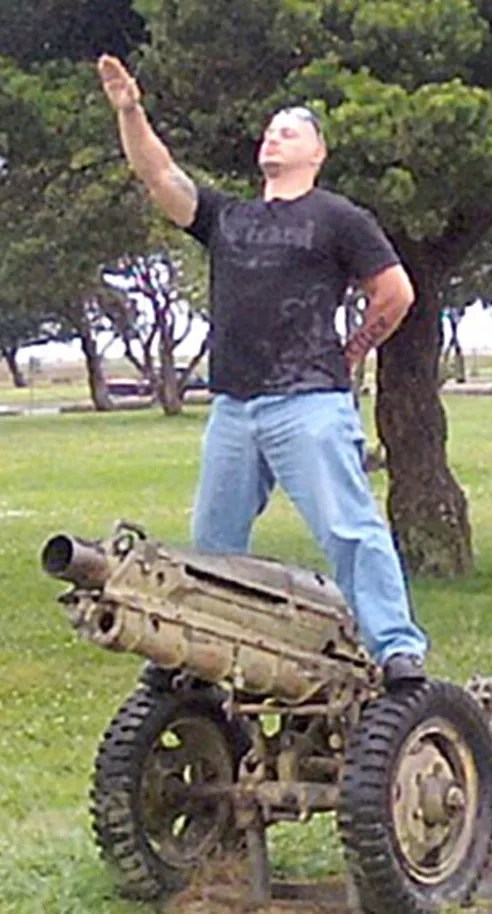
Accused murderer and neo-Nazi Travis Ricci, sieg heiling atop a howitzer.
Maricopa County Superior Court
Essentially, Blumberg treated Wellmaker like he was on trial, instead of Ricci. However, Wellmaker’s record pales by comparison to Ricci’s history of violence and white supremacist activity.
Ricci is currently serving a 22-year sentence for an incident that took place a few months after the Jaeger homicide: He pushed his girlfriend’s head into a wall, and then stabbed two men who tried to intervene – one in the hand, the other in the neck.
Needless to say, Ricci has failed to find Jesus in stir.
However, he claims to have found Islam. According to documents obtained from the Arizona Department of Corrections, in 2015 he informed the prison chaplain that he wished to change his religious preference from Asatru, a modern revival of the pagan Norse religion – observed by racists and non-racists alike – to Muslim, averring that he had accepted “Mohamed as my Profit [sic] and Allah as my divine savior.” He also wanted “all dietary rights and religious privileges that belong to the Muslim faith.”
Before turning Muslim, Ricci mentioned in one note to prison authorities that he required a special vegetarian diet because he was a Seventh Day Adventist.
Ricci’s “conversion” aside, ADC spokesman Andrew Wilder recently informed me that Ricci is now a suspected member of the Aryan Brotherhood, the much-feared, white supremacist prison gang that’s known for drug trafficking and murder-for-hire.
When Ricci has court appearances to make, he stays in the Maricopa County Sheriff’s Office jail system. MCSO has a file on Ricci’s alleged transgressions, which include everything from disobeying orders and making his own hooch to serving a fellow inmate with a beat-down so severe that it landed the man in the hospital.
Part of Ricci’s file: a December 2017 letter to a neo-Nazi pal on the outside. In it, Ricci seemed to anticipate his own future death sentence, wondering if death-row prisoners are allowed to have computer tablets. He also shared that he didn’t believe in “lucky objects,” but joshed about wanting “an unlucky butt plug to give to the state’s attorney.”
With that correspondence, Ricci included a joke Christmas card featuring a photocopied image, apparently of himself naked, decorated with SS lightning bolts. When the letter was intercepted by MCSO security, Ricci was written up for being in possession of “gang paraphernalia,” i.e., the card. In a written response to his jailers, Ricci argued that SS bolts were not a gang symbol, but rather referred to “belief systems,” such as “neo-Nazism and white supremacy.”
It’s a curious rebuttal, one that unintentionally offers an ironic riposte to Ricci’s counsel’s contention that Ricci is a French citizen by blood, and that his grandfather fought in the French resistance during WWII.
The French government asserts that the former is true, and in 2014, its Ministry of Justice and Ministry of Foreign Affairs wrote a joint letter to the Maricopa County Attorney’s Office pleading for Ricci’s life, as the French government opposes the application of the death penalty. Even if the part about Ricci’s grandpa is correct, it simply makes Ricci’s life a greater disappointment than it otherwise would be.
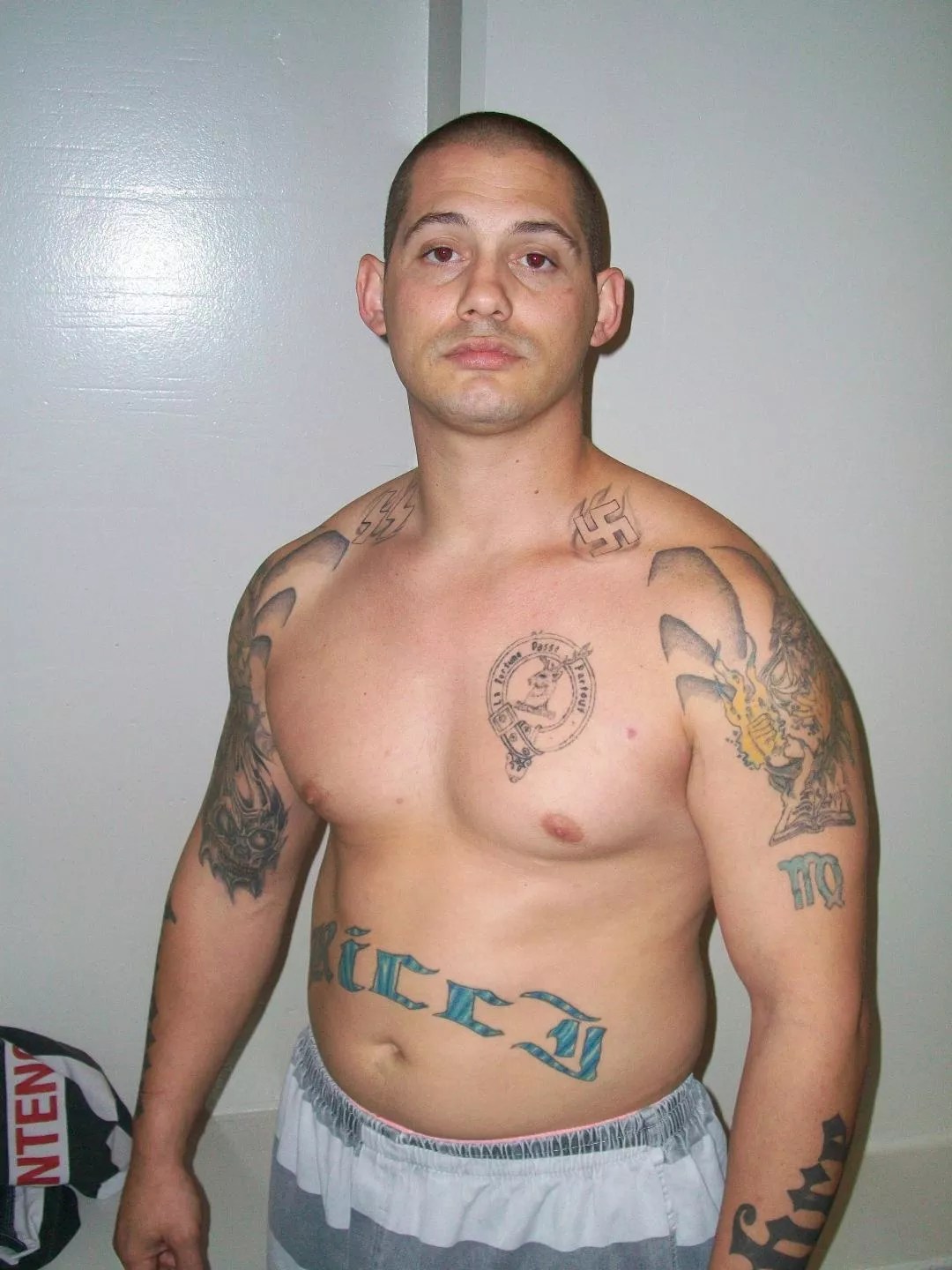
A photo of Travis Ricci shirtless taken not long after his arrest in 2010 on other charges.
Phoenix Police Department
Interestingly, Wellmaker says that he once encountered Ricci in county jail a couple of years after Jaeger’s murder and played chess with him during a tournament where the races squared off against each other. Ricci’s appearance had so changed, Wellmaker said, that he didn’t recognize him at first.
But as Wellmaker was getting ready to leave custody, Ricci approached Wellmaker, telling him, “They say I’m the one that shot your girlfriend … but I didn’t do it.”
Wellmaker told him to pull up his shirt. Ricci did so, and Wellmaker recognized Ricci’s distinctive stomach tattoo.
“I rushed him,” Wellmaker told me. “But the brothers held me back and told me to go home.”
The case against Ricci includes several witnesses that put him at a neo-Nazi barbecue taking place at a house nearby Palma Park before Jaeger’s murder. One of them, Ryan Maltba, hosted the event. Maltba, a former white supremacist, recently testified that Ricci left the party at one point, and later returned with a bogus tale about his encounter with a group of black men accosting a white girl.
Maltba, the founder of a local neo-Nazi gang, the Death’s Head Hooligans, said Ricci grabbed a shotgun with a pistol grip that had been brought to the party by Aaron Levi Schmidt, another Vinlander.
Schmidt has confessed to being the driver of the white sedan, from which Ricci allegedly fired his fatal blasts. Maltba told the jury that he almost got in the car himself, but his baby-mama and some of the other women at the party talked him out of it.
Ricci and Schmidt allegedly went gunning for Wellmaker, but ended up taking down Jaeger instead. Schmidt pleaded guilty to first-degree murder in 2012 as part of a deal with the state, though the terms of that agreement remain under seal. He is expected to testify against Ricci as a witness for the prosecution.

Kelley Ann Jaeger
Arizona Department of Corrections
Jaeger’s past is still a bit of a mystery. She did about a year in the Arizona Department of Corrections for passing bad checks, and struggled with substance abuse. According to court and prison documents, she was the mother of one daughter and one son, each by different partners. Jaeger listed her religion as Catholic. She also claimed that she was raised in New York state and had three brothers who were police officers with the New York City Police Department.
My attempts to contact Jaeger’s immediate family have not been successful. Her murder is one of nine attributed to the Arizona contingent of the Vinlanders Social Club, which was effectively dismantled in 2010 by Phoenix Police Department’s Career Criminal Squad, a specialized unit that targeted street gangs, which, sadly, is now defunct. Now-retired CCS detective John Justus led the crackdown on the group.
In our interview, Wellmaker said Jaeger refused to discuss her family with him, though he remembered one time when she fixated on a little girl outside a supermarket, coming around a corner. The girl turned and hugged a man nearby. Jaeger’s eyes filled with tears and she walked away.
Wellmaker described Jaeger, jokingly, as a “female extortionist,” who would scam gullible, usually older men into lending her money, which she would then distribute, Robin Hood-style, to other denizens of the street.
“People who have money, she’s gonna get it and pass it out,” he said. “She’d make sure everybody gets taken care of.”
Wellmaker remembered how it was she who approached him, Sadie Hawkins-style, about being boyfriend-girlfriend and that he was actually kind of scared of her at first.
She told him she was fascinated by the intense look on his face when he played chess for money, what he called his “side hustle.” They didn’t have sex for the first two weeks of their relationship, he said, but instead just “lay together.”
Their existence was transient, from hotel room to hotel room, but Wellmaker said they discussed getting married. He told me that he believes God snatched her up on the day of her death, and that her end was quick and without suffering.
“I felt like she was an angel,” he said. “So, I think it was a blessing that I got to kick it with an angel, who loved me more than any other person in my life.”
Stephen Lemons is a former columnist and reporter for Phoenix New Times who writes regularly for the website FrontPageConfidential.com.